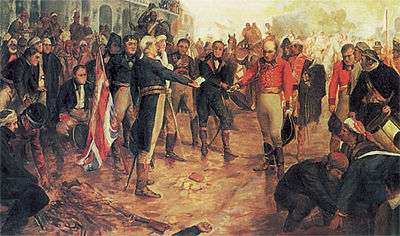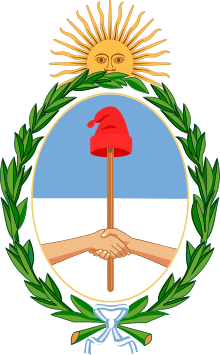Argentina–United Kingdom relations
 |
|
United Kingdom |
Argentina |
|---|---|
Argentine–United Kingdom relations refers to foreign relations between Argentina and the United Kingdom.
Both countries established diplomatic relations on December 15, 1823. Diplomatic relations were cut off before the Falklands War in 1982 and were reinstated in 1990. Post-war relations between the two countries improved significantly up until the mid-2000s. During the government of Cristina Fernández de Kirchner, relations became increasingly tense, with both countries reasserting their claims to the Falkland Islands. In 2016, British Prime Minister David Cameron and Argentine President Mauricio Macri held a meeting where they agreed to begin a new stage of dialogue and friendship between the two countries and reaffirming the strong relationship the two countries have historically.[1]
Today it is estimated that Argentina is home to the largest British community in Latin America, where it is reflected in the strong British influence in sports, education and customs.
Argentina has an embassy in London and the United Kingdom has an embassy in Buenos Aires. The current British Ambassador to Argentina is John Freeman and current Argentine Ambassador to the United Kingdom is Renato Carlos Sersale di Cerisano.

Both states are members of the G-20.
Country comparison
| |
| |
|---|---|---|
| Population | 43,417,000 (2015)[2] | 64,716,000 (2015)[3] |
| Area | 2,780,400 km2 (1,073,500 sq mi) | 242,495 km2 (93,628 sq mi) |
| Population density | 14.4/km2 | 255.6/km2 |
| Capital | Buenos Aires | London |
| Largest city | Buenos Aires 12,801,365 inhabitants (metropolitan area) | London 13,879,757 inhabitants (metropolitan area) |
| Government | Federal Presidential Constitutional Republic | Unitary Parliamentary Constitutional Monarchy |
| Official languages | Spanish | English |
| Main religions | Catholic 76.5%, Atheists and Agnostics 11.3%, Evangelical Protestants 9%, Jehovah's Witnesses 1.2%, Mormons 0.9%, Islam, Judaism and Buddhism 1.2%. [4] | Christians 71.6%, Islam 2.8%, Hinduism 1.0%, Sikhism 0.6%, Judaism 0.5%, Buddhism 0.3%, Other religions 0.3% |
| Ethnic groups | 97% White (European descent), 3% Mestizo, Asian and Black. | 87.1% White British, 7.0% Asian, 3.0% Black, 2.0% Mixed, 0.9% others. |
| GDP (PPP) | $964.279 billion[5] | $2.569 trillion[6] |
| Literacy rate[7] | 98,9 | 99,0 |
| Human Development Index[8] | 0.836 (Very High) | 0.907 (Very High) |
History
Colonial era
The modern territory of Argentina was initially part of the Spanish Empire. The Falkland Islands sovereignty dispute was initially a dispute of Spain and Britain, with events such as the Falklands Crisis of 1770. Spain allied with France against Britain during the Napoleonic Wars, so Britain launched the British invasions of the Río de la Plata. The first British attack invaded Buenos Aires, the city was liberated by Santiago de Liniers with forces from Montevideo. A second attack invaded Montevideo, but failed to invade Buenos Aires a second time, and Montevideo was returned to Spain during the surrender. France attacked Spain (starting the Peninsular War in Europe) and Spain allied with Britain, so the British made no further attacks at the Río de la Plata.
The Peninsular War, the social changes caused by the huge militarization of the people of Buenos Aires and other local and international influences led to the May Revolution, which began the Argentine War of Independence. Britain stayed neutral during the conflict, and accepted the Argentine Declaration of Independence on December 15, 1823. The formal relations were established with the Treaty of Friendship, Commerce and Navigation Between Argentina and the United Kingdom.
Argentine National Organization (1853-1879)
During the National Organization period, Argentina began to outline a foreign policy favoring relations with Britain, which became the main buyer of Argentine raw materials and the major source of investment in the country. In 1865, during the Liberal government of Bartolome Mitre British involvement was tested by the conduct of the Paraguayan War of Argentina, Uruguay and Brazil against the Republic of Paraguay. During the government of Nicolas Avellaneda, the Conquest of the Desert, 1879 he favored the establishment, in the newly conquered lands of immigrant settlers, and dissemination of railroads of British capital, and cattle and sheep raising.
The Conservative Republic (1880-1916)
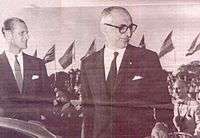
Product of a series of geographical expeditions to Patagonia, the Strait of Magellan and Tierra del Fuego made by the Argentine explorer Francisco Pascasio Moreno and Chilean expert Diego Barros Arana between 1873 and 1879, Argentina in 1881 signed the Treaty of limits with Chile. In 1896, problems with the demarcation, the decision had to undergo an arbitration award in Britain. At that time, Moreno was appointed expert on behalf of the Argentine government. In a gesture of brotherhood, February 15, 1899 was found in the Strait of Magellan, Argentine President Julio Argentino Roca and Chilean President Federico Errazuriz Echaurren, in what became known as the "Embrace of the Straits". Finally, the British award was ratified by the General Treaty of Arbitration of 1902 signed in Santiago by Acting Foreign Minister Jose A. Terry, who was criticized on the home front because of the concessions that the country did to Chile and because subjected to perpetual conflict resolution between the two countries to the British crown.
In 1902, the Chancellor of the second government of Julio Argentino Roca, Dr. Luis María Drago, made an outstanding performance in his defence of Latin American sovereignty against the sea blockade of Venezuela imposed by Britain, Germany and Italy as punishment for debts that Venezuela had with those countries, and that the president Cipriano Castro refused to pay.
The May 1, 1933 was signed the Roca–Runciman Treaty. It was a trade agreement Avoidance in Argentina the effects of a pro-Commonwealth countries, in exchange for lower taxes for imported products from the UK British trade policy [rendered illegible by bad grammar]. It was signed by Vice President of Argentina, Julio Argentino Pascual Roca -a request of the president Agustín Pedro Justo and Walter Runciman.
Cultural relations
According to the 2001 UK Census, some 3,932 Argentine-born people were living in the UK.[9] Between 1997 and 2008, 1,062 Argentines acquired British citizenship.
There is a strong British cultural influence in Argentina and a large Argentine-British community around Buenos Aires. There is also a strong Welsh-speaking Argentine-Welsh community in Chubut, Patagonia. Of the 25,000 Welsh speakers in Argentina,[10] 5,000 live in the Chubut region,[11] particularly in the original Welsh settlements of Trelew and Trevelin. A large number of Argentine football players play for British clubs. The British Council promotes an active academic, cultural and educational programme in Argentina. The British Council administers the Chevening Scholarship programme, funded by the Foreign and Commonwealth Office, which sends approximately 15 Argentine postgraduate students to the UK each year.
English background
English culture, or a version of it as perceived from outside, had a noted effect on the culture of Argentina, mainly in the middle classes. In 1888 local Anglo-Argentines established the Hurlingham Club, based on its namesake in London. The city of Hurlingham, Buenos Aires and Hurlingham Partido in Buenos Aires Province later grew up around the club and took their names from it. The Córdoba Athletic Club, one of the oldest sports clubs in Argentina, was founded in 1882 by English men that lived in Córdoba working in the railroads.
In 1912 Harrods opened a department store in Buenos Aires; the only Harrods ever opened outside London. Harrods Buenos Aires became independent of Harrods in the 1940s but still traded under the Harrods name. Afternoon tea became standard amongst large segments of the population and generated the popular merienda, an afternoon snack also known simply as la leche (milk) because it was served with tea or chocolate milk along with sweets. The Richmond café on Florida Street is a notable tea venue near the Harrods department store, now turned into an exhibition hall.
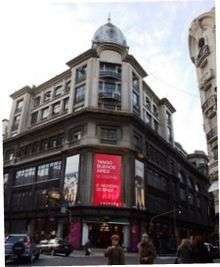
Gardened chalets built by railway executives near railway stations in suburbs such as Banfield, Temperley, Munro, Ranelagh and Hurlingham gave a pointed English atmosphere to local areas in Buenos Aires, especially in winter when shrouded in grey mists and fallen oak leaves over cobblestones. Belgrano R, within the Belgrano district, is another train station known for the British neighbourhood around it originated by the railway. An Anglican church from 1896 and the Buenos Aires English High School[12] founded by Alexander Watson Hutton in 1884 are both located in this area. Also important are the railway terminals Retiro in the homonymous neighbourhood and Constitución. There are numerous countryside stations in the Pampas.
Around 100,000 Anglo-Argentines are the descendants of English immigrants to Argentina. They are one of the most successful immigrant groups of Argentina, gaining prominence in commerce, industry, and the professions. Many are noted by their ability to speak English in family circles with an undistinguishable English accent. An English-language newspaper, the Buenos Aires Herald, continues to be published daily in Buenos Aires.

Anglo-Argentines have traditionally differed from their fellow Argentines by largely retaining strong ties with their mother country, including education and commerce.[13] Many of the schools in Argentina are bilingual offering both English language and Spanish language, including Northlands School, St. Mark's College, Balmoral College, St. Alban's College, St. George's College, Belgrano Day School and Washington School. Buenos Aires had a number of branches of the Asociación Argentina de Cultura Inglesa (English Cultural Association) and throughout the 20th century English language learning and teaching in state schools and private institutions was invariably geared towards the Received Pronunciation. Blue blazers and grey flannels are still used as uniforms in most private schools.
The Anglo-Argentine Society, based in London, was founded in 1948 and has about 900 members. It is a society for Argentine people living in the United Kingdom, particularly those of Anglo-Argentine heritage. One of its main aims is to promote understanding and friendship between the two countries.[14] Also in London is the Canning Club, formerly the Argentine Club until Juan Perón nationalised Argentine-based British businesses, the main source of revenue of the club in the 1940s. The club is for those with a particular link to, or special interest in, Argentina and other Latin American countries.
The Coghlan neighbourhood in Buenos Aires, known for its large English-style residences, was originally inhabited by English and Irish immigrants. Furthermore, Caballito contains an area called the "English District".
In 1794, the British Empire opened a consulate in San Nicolás, leading to the development of a large British community in the area, which became known as the "English borough". They founded the English Merchants' Society in 1810 and in 1822 the British Consulate became home to the first modern bank in Buenos Aires.
Scottish influence

The so-called "father of Argentine football" was a Glaswegian schoolteacher, Alexander Watson Hutton, who first taught football at St. Andrew's Scots School in Buenos Aires in the early 1880s. On 4 February 1884[15] he founded the Buenos Aires English High School [sic] where he continued to instruct the pupils in the game.[16] In 1891 Hutton established the Association Argentine Football League,[17] the first football league outside of the British Isles.[18] Five clubs competed but only one season was ever played.
The St. Andrew's Scots School was established in Buenos Aires in 1838 and is the oldest school of British origin in South America.
Y Wladfa
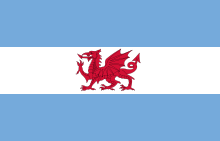
The idea of a Welsh colony in South America was put forward by Professor Michael D. Jones, a Welsh nationalist non-conformist preacher[19]:23 based in Bala who had called for a new "little Wales beyond Wales". He spent some years in the United States, where he observed that Welsh immigrants assimilated very quickly compared with other peoples and often lost much of their Welsh identity.[19]:22 He proposed setting up a Welsh-speaking colony away from the influence of the English language. He recruited settlers and provided financing; Australia, New Zealand and even Palestine were considered, but Patagonia was chosen for its isolation and the Argentines' offer of 100 square miles (260 km²) of land along the Chubut River in exchange for settling the still-unconquered land of Patagonia for Argentina.[19]:23–30 Michael D Jones had been corresponding with the Argentinean government about settling an area known as Bahía Blanca where Welsh immigrants could preserve their language and culture. The Argentinean government granted the request as it put them in control of a large tract of land. A Welsh immigration committee met in Liverpool and published a handbook, 'Llawlyfr y Wladfa' to publicise the scheme to form a Welsh colony in Patagonia which was distributed throughout Wales.
Towards the end of 1862, Captain Love Jones-Parry and Lewis Jones (after whom Trelew was named) left for Patagonia to decide whether it was a suitable area for Welsh emigrants. They first visited Buenos Aires where they held discussions with the Interior Minister Guillermo Rawson then, having come to an agreement, headed south. They reached Patagonia in a small ship named the Candelaria, and were driven by a storm into a bay which they named "Porth Madryn" after Jones-Parry's estate in Wales. The town which grew near the spot where they landed is now named Puerto Madryn. On their return to Wales they declared the area to be very suitable for colonisation.
The permanent European settlement of the Chubut Valley and surrounding areas began on 28 July 1865 when 153 Welsh settlers arrived aboard the converted tea-clipper Mimosa. The Mimosa had cost £2,500 to hire for the voyage and convert to passenger use, and the fare from Liverpool to Patagonia was £12 for adults and £6 for children, although anyone willing to travel was taken on the journey regardless of ability to pay.[20] The Mimosa settlers, including tailors, cobblers, carpenters, brickmakers, and miners, comprised 56 married adults, 33 single or widowed men, 12 single women (usually sisters or servants of married immigrants), and 52 children; the majority (92) were from the South Wales Coalfield and English urban centres.[19]:35 There were few farmers, which was rather unfortunate particularly when they discovered that the attractions of the area had been oversold and they had landed in an arid semi-desert with little food; they had been told that the area was like lowland Wales. At the coast there was little drinking water, and the group embarked on a walk across the parched plain with a single wheelbarrow to carry their belongings. Some died and a baby, Mary Humphries, was born on the march. John Williams was the only colonist with any form of rudimentary medical skill.
Once they reached the valley of the Chubut River, their first settlement was a small fortress on the site which later became the town of Rawson, now the capital of Chubut province.[19]:45 This was referred to as Yr Hen Amddiffynfa (The Old Fortress).[19]:44 The first houses, constructed from earth, were washed away by a flash flood in 1865, and new houses of superior quality were built to replace them.[19]:45–47 The floods also washed away crops of potatoes and maize.[19]:52 The rainfall in the area was much less than the colonists had been led to expect, leading to crop failures.
Religion
Anglican churches were established in Argentina, where the religion is otherwise overwhelmingly Roman Catholic, in the early 19th century to give a chaplaincy service to expatriate workers living in Argentina. In 1824 permission was given to hold Anglican church services, and in 1831 St. John's Church was built in San Nicolás, Buenos Aires[21][22] on land donated in 1830 by Governor Juan Manuel de Rosas for the benefit of the new St. John the Baptist Anglican Church. It is the oldest in existence in Buenos Aires.
English naval captain and Christian missionary, Allen Gardiner founded the Patagonia Mission (later to be renamed the South American Missionary Society) in 1844 to recruit, send, and support Protestant Christian missionaries. His first mission, which included a surgeon and three fishermen was sent to the Yaghans on the island of Isla Grande de Tierra del Fuego. They arrived at Picton island in Tierra del Fuego in December 1850, but their food began to run out. They had expected scheduled supplies, however they did not arrive, and by September 1851 they had died from sickness and hunger. The Patagonia Mission continued and in 1854 changed its name to the South American Missionary Society.[21]
In January 1869 the Society established a mission at Ushuaia in Tierra del Fuego under its superintendent, Waite Hockin Stirling.[23] On 21 December 1869 Stirling was ordained at Westminster Abbey as the first Bishop of the Falkland Islands and at the time had episcopal authority over the whole of South America, until power shifted to the Bishop of Buenos Aires.[22] In 1914 the first mission, Misión Chaqueña, was founded in the north of Argentina.
Falklands War
On April 2, 1982, Argentina under President Leopoldo Galtieri launched an invasion of the Falkland Islands and on April 3, 1982 this was followed by the Argentine invasion of the South Georgia Island.[24] This resulted in the British deploying forces to the Falkland Islands to fight in the Falklands War.
Post-war relations
.jpg)
Diplomatic relations between the two countries were reinstated in 1990 after the departure of Margaret Thatcher from the post of Prime Minister of the United Kingdom. Argentina now has an embassy in London and the United Kingdom has an embassy in Buenos Aires. Relations improved further in the 1990s between the UK and Argentina. In 1998, Carlos Menem, the President of Argentina visited London, where he reaffirmed his country's claims to the Islands, although he stated that Argentina would use only peaceful means to obtain them. In 2001, Tony Blair, Prime Minister of the United Kingdom visited Argentina where he stated that he hoped the UK and Argentina could resolve their differences that led to the 1982 war. However, no talks on sovereignty took place during the visit and Argentina's President Néstor Kirchner stated that he regarded gaining sovereignty over the islands as a 'top priority' of his government.[25]
Modern times
Since the mid-2000s, diplomatic relations between the UK and Argentina have become increasingly strained. In 2006, Argentina renewed claims to the Falkland Islands, citing concern over fishing and petroleum rights.[26] On 28 March 2009, UK Prime Minister Gordon Brown stated that there was “nothing to discuss” with Cristina Kirchner, the Argentine president, over sovereignty of the islands, when they met in Chile on his pre-2009 G-20 London Summit world tour.[27] On 22 April 2009 Argentina made a formal claim to the UN to an area of the continental shelf encompassing the Falklands, South Georgia and South Sandwich Islands, and parts of Antarctica, citing 11 years worth of maritime survey data.[28] The UK quickly protested these claims.[29]
Since 2010, reports of British oil exploration around the Falkland Islands have caused a further downturn in UK-Argentine relations.[30] In February 2010 the Argentine government announced that ships travelling to the Falklands (as well as South Georgia and the South Sandwich Islands) would require a permit to use Argentine territorial waters. Despite the new restrictions, Desire Petroleum began drilling for oil on 22 February 2010, about 54 nautical miles (100 km, 62 mi) north of the Islands.[31]
Governments of South American countries have generally shown support for Argentina over the Falkland Islands sovereignty dispute in recent years. This is in contrast to the Falklands War when Britain was supported by Chile. In 2011 the Mercosur bloc agreed to close ports to ships flying the Falkland Islands flags, while British-flagged ships would continue to be allowed.[32] The Unasur group of nations has asked the United Kingdom to pursue negotiations over the islands' sovereignty.[33] On 19 March 2012, Peru announced that it was cancelling a visit by the Royal Navy frigate HMS "Montrose" in support of Argentina's claim to the islands.[33]

At the G20 Summit in Mexico in June 2012, British Prime Minister David Cameron and Argentine President Cristina Fernández de Kirchner met unexpectedly in a corridor on the fringes of the G20 Summit and exchanged, at least in diplomatic terms, some rather heated words. Prime Minister Cameron told President Kirchner that she should "respect the views" of Falkland residents, who had announced the 2013 referendum, on the issue of future sovereignty of the island. President Kirchner then attempted to hand an envelope to the Prime Minister but he refused to accept it.[34]
In March 2013 the Falkland Islanders voted overwhelmingly in a referendum for the territory to remain British. 1513 to 3, 99.8% in favor of British control. Argentina dismissed the Falkland Islands' sovereignty referendum.[35][36] The UK Government urged Argentina and other countries to respect the islanders' wishes.[37]
On the 33rd anniversary of the invasion of the islands on the 2nd of April 2015 Premier Oil, Rockhopper Exploration and Falkland Oil & Gas announced that they had found oil and gas in an offshore field to the north of the islands. On the 3 April 2015 the Argentine Government announced that it was preparing to take legal action against the United Kingdom and the companies involved in oil exploration around the islands without Argentina's permission.[38] On the 8th April 2015 Argentina officially condemned British plans to boost Britain's military presence on the Falklands and that it would be pressing criminal charges against companies conducting oil and gas exploration in the islands.[39]
On 22 November 2015, after a tie in the first round of presidential elections on 25 October, Mauricio Macri won the first ballotage in Argentina's history, beating Front for Victory candidate Daniel Scioli and becoming president-elect. Macri is the first democratically elected non-radical or peronist president since 1916, although he had the support of the first mentioned.[105] He took office on 10 December 2015. In April 2016, the Macri Government introduced austerity measures intended to tackle inflation and public deficits.[106] Macri has struck a more conciliatory note with regards to the Falklands and appears to wish to have much more cordial relations with Britain, but he has nevertheless reaffirmed Argentine sovereignty over the Malvinas as a long-term goal.
Twinnings
-
 Esquel, Chubut Province and
Esquel, Chubut Province and 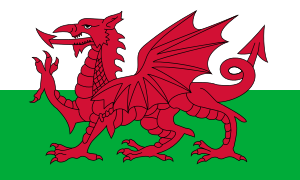 Aberystwyth, Ceredigion
Aberystwyth, Ceredigion -
 La Plata, Buenos Aires Province and
La Plata, Buenos Aires Province and  Liverpool, Merseyside
Liverpool, Merseyside -
 Puerto Madryn, Chubut Province and
Puerto Madryn, Chubut Province and  Nefyn, Gwynedd
Nefyn, Gwynedd -
 Tres de Febrero, Buenos Aires Province and
Tres de Febrero, Buenos Aires Province and  Folkestone, Kent
Folkestone, Kent -
 Trelew, Chubut Province and
Trelew, Chubut Province and  Caernarfon, Gwynedd
Caernarfon, Gwynedd
Gallery
-
Red telephone box in Buenos Aires
-

The London Shop in Buenos Aires
-
Recreation of the landing of Mimosa sailboat.
-
_Chubut.jpg)
Spanish-Welsh bilingual signage in Loma Maria (Bryniau Meri)
-

Buenos Aires Scottish Guard
-

Argentines of Scottish descent
See also
- Foreign relations of Argentina
- Foreign relations of the United Kingdom
- Latin American migration to the United Kingdom
- List of Ambassadors of the United Kingdom to Argentina
- St. Andrew's Scots School
- University of San Andrés
- Buenos Aires English High School
- English Argentine
- Welsh Argentine
- Scottish Argentine
References
- ↑ "Mauricio Macri se reunió con David Cameron en Davos". Infobae. 21 January 2016. Retrieved 21 January 2016.
- ↑ http://esa.un.org/unpd/wpp/Publications/Files/Key_Findings_WPP_2015.pdf
- ↑ http://www.ons.gov.uk/ons/guide-method/census/2011/uk-census/index.html
- ↑ http://www.ceil-conicet.gov.ar/wp-content/uploads/2013/02/encuesta1.pdf
- ↑ http://www.imf.org/external/pubs/ft/weo/2015/02/weodata/weorept.aspx?pr.x=42&pr.y=12&sy=2013&ey=2020&scsm=1&ssd=1&sort=country&ds=.&br=1&c=213&s=NGDPD%2CNGDPDPC%2CPPPGDP%2CPPPPC&grp=0&a=
- ↑ http://www.imf.org/external/pubs/ft/weo/2015/02/weodata/weorept.aspx?pr.x=43&pr.y=14&sy=2014&ey=2020&scsm=1&ssd=1&sort=country&ds=.&br=1&c=112&s=NGDPD%2CNGDPDPC%2CPPPGDP%2CPPPPC&grp=0&a=
- ↑ http://hdr.undp.org/en/media/HDR_2010_EN_Complete.pdf
- ↑ http://hdr.undp.org/sites/default/files/hdr_2015_statistical_annex.pdf
- ↑ "Country-of-birth database". Organisation for Economic Co-operation and Development. Retrieved 29 July 2010.
- ↑ "Languages of Argentina"- Ethnologue.com
- ↑ "Wales and the World" - Wales.com
- ↑ "Buenos Aires High School". Buenos Aires High School. Archived from the original on 22 August 2008. Retrieved 6 January 2009.
- ↑ Graham-Yooll, Andrew (3 July 1999). "Dos nostalgias" (in Spanish). Clarín (Argentine newspaper). Retrieved 8 January 2008.
- ↑ "The Anglo-Argentine Society". The Anglo-Argentine Society. Retrieved 8 January 2008.
- ↑ "Alumni Athletic Club" - RSSSF. URL accessed on June 6, 2006.
- ↑ "Buenos Aires English High School" URL accessed on June 6, 2006.
- ↑ "Argentina 1891" - RSSSF. URL accessed on June 6, 2006.
- ↑ Observer Sport Monthly (June 4 2006) - "Salvation army " URL accessed on June 10, 2006.
- 1 2 3 4 5 6 7 8 Williams, Glyn (1975). The desert and the dream: A study of Welsh colonization in Chubut 1865 – 1915. Cardiff: University of Wales Press. ISBN 0-7083-0579-2.
- ↑ Wilkinson, Susan (September 1998). "Welsh immigrants in Patagonia: Mimosa, the old ship that sailed into history". (originally) Buenos Aires Herald. Retrieved 2007-01-05.
- 1 2 "Anglicans in Argentina". Iglesia Anglicana Argentina. Retrieved 7 January 2008.
- 1 2 Millam, Peter J. (August 1997). "The Falklands - The World's Largest Diocese: "A Noble History and a Glorious Past"". Falkland Islands Newsletter. Falkland Islands: Falkland Islands Association (70). Retrieved 7 January 2008.
- ↑ Bridges, E L (1948) The Uttermost Part of the Earth Republished 2008, Overlook Press ISBN 978-1-58567-956-0
- ↑ "Argentina invades Falklands". History.com.
- ↑ "Blair y Kirchner adelantaron diálogo". BBC World Service (in Spanish). 14 July 2003. Retrieved 14 June 2010.
- ↑ McDermott, Jeremy (30 June 2006). "Argentina renews campaign over Falklands claim". The Telegraph.
- ↑ Bourne, Brendan (28 March 2009). "Gordon Brown rejects Argentina's claim to the Falklands". The Times (London).
- ↑ Piette, Candace (22 April 2009). "Argentina claims vast ocean area". BBC News.
- ↑ "'Not so fast,' says Britain as Argentina makes fresh appeal to UN over Falkland Islands". The Mail on Sunday. London. 23 April 2009.
- ↑ "Oil drilling begins in the Falkland Islands". Channel 4 News. 21 February 2010.
- ↑ "Drilling for oil begins off the Falkland Islands". BBC News. 22 February 2010. Retrieved 22 February 2010.
- ↑ "Argentina and the Falklands: Rocking the boat". The Economist. 31 December 2011. Retrieved 16 January 2013.
- 1 2 (Spanish) Perú cancela la visita de una fragata británica en solidaridad con Argentina, BBC Mundo, 19 March 2012.
- ↑ "David Cameron and Argentina's Cristina Kirchner in corridor clash over Falklands ''The Telegraph (UK)". Telegraph.co.uk. Retrieved 2012-07-02.
- ↑ Borger, J. (1 February 2013). "UK 'disappointed' as Argentina turns down talks over Falklands.". The Guardian. Retrieved 26 January 2014.
- ↑ "Falkland Islands: respect overwhelming 'yes' vote, Cameron tells Argentina". The Guardian. The Guardian. 12 March 2013. Retrieved 12 March 2013.
- ↑ "Falklands referendum: Voters choose to remain UK territory". BBC UK. 12 March 2013.
- ↑ Harriet Alexander & Victoria Ward (3 April 2015). "Argentina to take legal action against UK for Falklands drilling". The Telegraph. Retrieved 27 August 2015.
- ↑ Sherwell, Philip (9 April 2015). "Argentina summons British ambassador in Falklands oil row". The Telegraph. Retrieved 27 August 2015.
External links
- List of Treaties ruling the relations Argentina and United Kingdom (Argentine Foreign Ministry, in Spanish)
- Argentine Embassy in London
- British embassy in Buenos Aires
